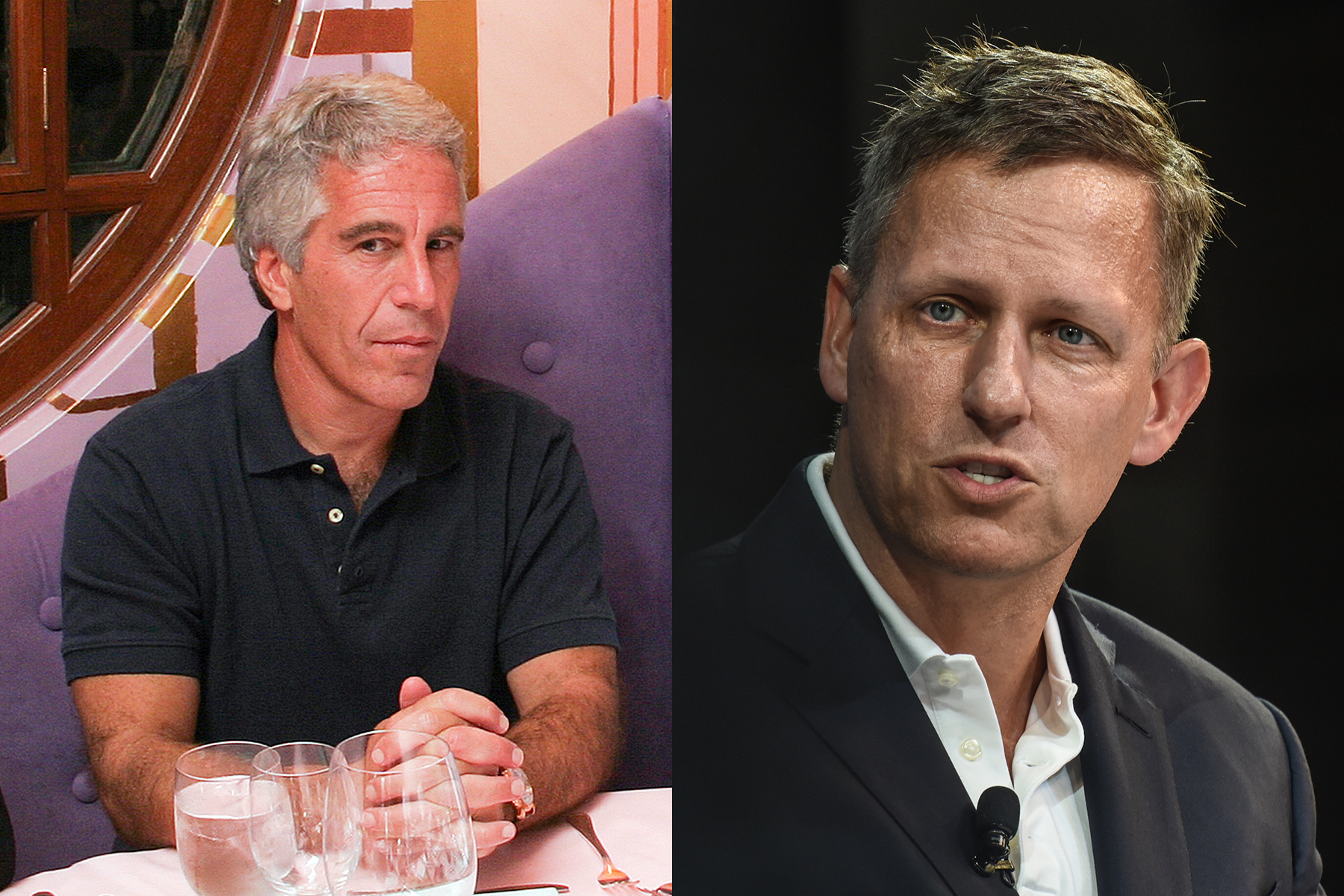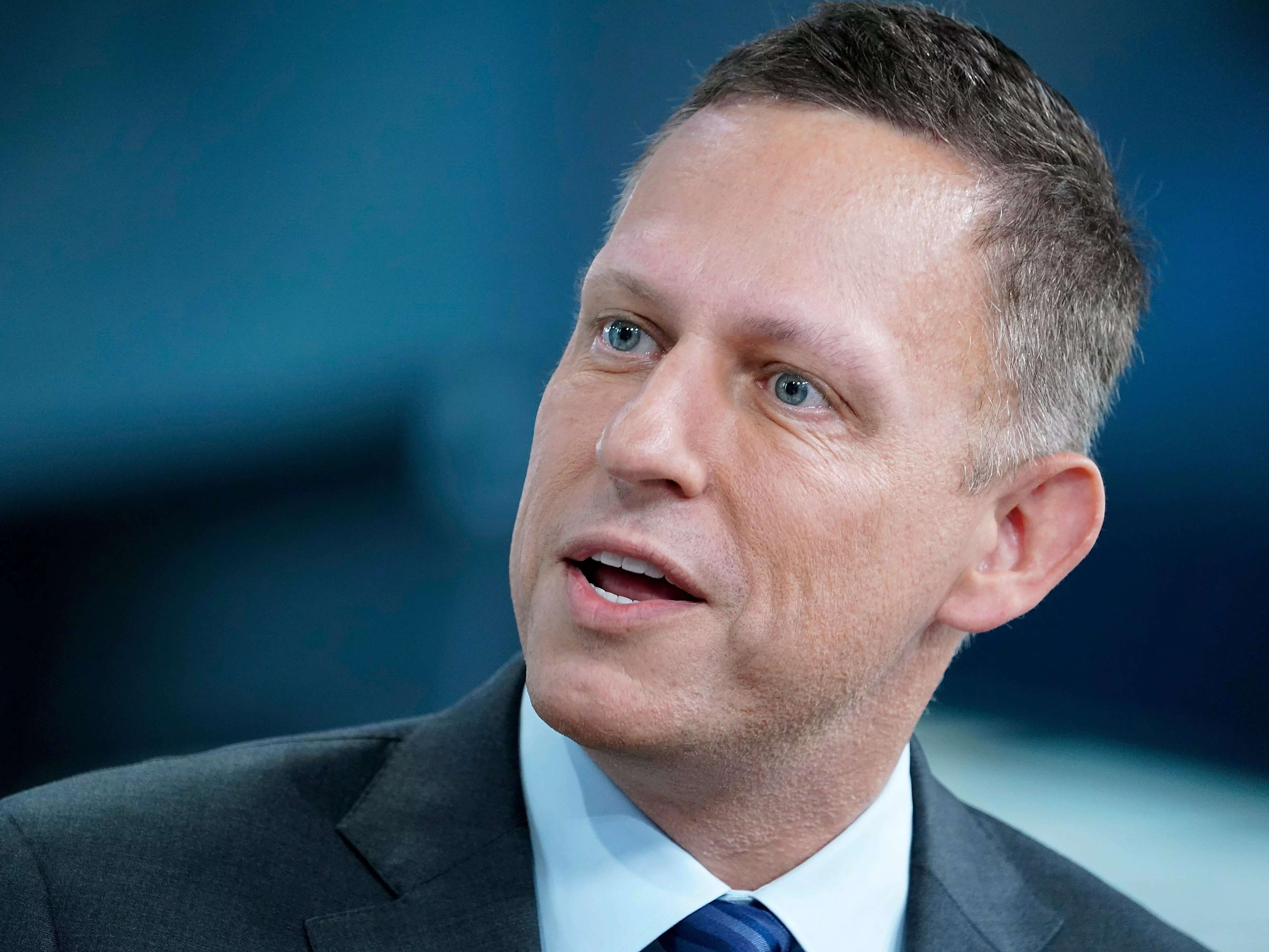The names Peter Thiel and Jeffrey Epstein, while prominent in their own rights, have surfaced together in discussions that have intrigued and puzzled many. Peter Thiel, a renowned venture capitalist and co-founder of PayPal, is a figure synonymous with innovation and success in the tech industry. Meanwhile, Jeffrey Epstein, a financier and convicted sex offender, made headlines for his controversial lifestyle and the high-profile connections he maintained. The intersection of these two figures raises questions about the nature of their relationship, the implications of their association, and the broader impact on the tech and financial sectors.
As we delve into the lives of Peter Thiel and Jeffrey Epstein, it becomes essential to understand the backgrounds and careers of these individuals. Thiel's journey from a successful entrepreneur to an influential venture capitalist is marked by several landmark achievements. His investments and strategic insights have left a significant mark on the technology landscape. On the other hand, Epstein's life is shrouded in mystery and controversy, with his financial dealings and social connections often attracting scrutiny and speculation. By exploring their biographies, we can piece together how their paths may have crossed and what it means for the world of business and beyond.
The connection between Thiel and Epstein is a subject that invites a great deal of curiosity and debate. Their association, whether direct or indirect, sheds light on the complex web of relationships that exist among powerful figures in society. In this article, we will examine the backgrounds of Peter Thiel and Jeffrey Epstein, explore their personal and professional lives, and analyze the implications of their connection. By doing so, we aim to provide a comprehensive understanding of the dynamics at play and offer insights into how such relationships influence the broader socio-economic landscape.
Table of Contents
Peter Thiel: Biography
Peter Thiel is a German-American entrepreneur known for his influential role in the world of technology and venture capitalism. Born on October 11, 1967, in Frankfurt, Germany, Thiel later moved to the United States, where he pursued an education that laid the foundation for his future endeavors. He attended Stanford University, earning a Bachelor of Arts in Philosophy in 1989 and a Juris Doctor from Stanford Law School in 1992.
Thiel's career trajectory is marked by his co-founding of PayPal, an online payment system that revolutionized the way financial transactions are conducted over the internet. As the CEO of PayPal, he steered the company towards success, ultimately leading to its acquisition by eBay in 2002. Following his success with PayPal, Thiel became one of the first investors in Facebook, further solidifying his reputation as a savvy venture capitalist.
As of today, Thiel is a partner at Founders Fund, a venture capital firm he co-founded in 2005. His investment portfolio includes numerous successful tech companies, and his insights have proven invaluable in identifying and nurturing innovative startups. Beyond business, Thiel is also known for his political and philosophical beliefs, which often attract attention and debate.
| Personal Details | Information |
|---|---|
| Full Name | Peter Andreas Thiel |
| Date of Birth | October 11, 1967 |
| Nationality | German-American |
| Education | BA in Philosophy, JD from Stanford Law School |
| Occupation | Entrepreneur, Venture Capitalist |
Jeffrey Epstein: Biography
Jeffrey Epstein was a financier and philanthropist whose life and career were marred by controversy and criminal activities. Born on January 20, 1953, in Brooklyn, New York, Epstein's early life was characterized by a keen interest in mathematics and science. He attended Cooper Union and later, New York University, though he left without obtaining a degree.
Epstein began his career as a teacher at the Dalton School in Manhattan, where he taught calculus and physics. However, his career took a significant turn when he joined Bear Stearns, a global investment bank, as an options trader in the late 1970s. Epstein's financial acumen led to his rapid rise within the firm, eventually becoming a limited partner before leaving to start his own financial management firm.
Throughout the 1980s and 1990s, Epstein built a vast network of influential clients and connections, managing the wealth of some of the world's richest individuals. However, his life took a dark turn as allegations of sexual misconduct and trafficking emerged, leading to his conviction in 2008. Epstein's subsequent arrest and untimely death in 2019 left many questions unanswered, with investigations into his activities continuing posthumously.
| Personal Details | Information |
|---|---|
| Full Name | Jeffrey Edward Epstein |
| Date of Birth | January 20, 1953 |
| Nationality | American |
| Education | Attended Cooper Union, New York University |
| Occupation | Financier |
The Connection Between Thiel and Epstein
The connection between Peter Thiel and Jeffrey Epstein has been a topic of interest and speculation. While there is no direct evidence of a close personal relationship between the two, they are connected through overlapping social circles and shared acquaintances. Both figures have maintained relationships with influential individuals in finance, technology, and politics, which naturally leads to intersections in their networks.
Epstein's reputation for associating with high-profile personalities extends to the tech industry, where he reportedly sought investments and connections with individuals like Thiel. There have been reports of Epstein attending gatherings and events frequented by Thiel, suggesting a social overlap, although the depth and nature of their interactions remain unclear.
Thiel, known for his strategic investments and forward-thinking approach, has often been linked to individuals who can provide insights or opportunities within the tech industry. This may explain his peripheral connection to Epstein, who was known for his financial prowess and connections, despite the controversies surrounding him.
Thiel's Career and Impact
Peter Thiel's career is a testament to innovation and strategic foresight, shaping the technology landscape in profound ways. His role in co-founding PayPal marked a pivotal moment in the evolution of digital payments, making online transactions more accessible and secure. Thiel's vision for PayPal was not just about creating a payment platform but transforming the way people engage in commerce on a global scale.
After PayPal's acquisition by eBay, Thiel turned his attention to venture capital, co-founding Founders Fund, a firm known for its bold investments in groundbreaking technologies. Thiel's investment in Facebook as one of its earliest backers is a prime example of his ability to identify potential and take calculated risks. This decision not only yielded significant financial returns but also cemented his status as a visionary investor.
Thiel's influence extends beyond individual investments. His public advocacy for technological progress and innovation has inspired a new generation of entrepreneurs. Through his support of initiatives like the Thiel Fellowship, which encourages young people to pursue entrepreneurial endeavors rather than traditional education paths, Thiel champions a future driven by creativity and innovation.
Epstein's Life and Controversies
Jeffrey Epstein's life was a complex tapestry of financial success and criminal activity, culminating in a legacy of controversy. His rise to prominence in the financial world was marked by his ability to manage and grow the wealth of some of the richest individuals. However, his career was overshadowed by allegations of sexual misconduct and exploitation, which ultimately led to his downfall.
Epstein's legal troubles began in the mid-2000s when allegations of sexual abuse and trafficking emerged. In 2008, he was convicted of soliciting a minor for prostitution, resulting in a controversial plea deal that was widely criticized. Despite this, Epstein maintained his influential social network, continuing to interact with high-profile individuals across various sectors.
The arrest of Epstein in 2019 on federal charges of sex trafficking reignited public interest and scrutiny into his activities. His subsequent death in jail, ruled a suicide, left many questions unanswered, sparking conspiracy theories and ongoing investigations into his life and the network he maintained.
Analyzing the Relationship
Understanding the relationship between Peter Thiel and Jeffrey Epstein requires a nuanced analysis of their respective social and professional circles. While there is no substantial evidence suggesting a close personal bond, their connection highlights the intricate web of relationships among powerful figures.
The tech industry, known for its interconnected nature, often sees individuals like Thiel navigating a landscape where networking and alliances are crucial. Epstein's presence in such circles, despite his controversial reputation, suggests a degree of strategic networking aimed at leveraging opportunities and influence.
For Thiel, maintaining a broad network of contacts, including those with financial expertise like Epstein, can be seen as part of his approach to staying informed and competitive in an ever-evolving industry. However, it is critical to distinguish between professional associations and personal endorsements, particularly given the controversies surrounding Epstein.
Impact on the Tech Industry
The presence of figures like Jeffrey Epstein in tech circles raises important questions about the influence of non-tech entities in shaping the industry's future. While Epstein's connections to individuals like Peter Thiel may not have directly impacted specific technological advancements, they underscore the importance of ethical considerations in business relationships.
The tech industry, driven by innovation and disruption, often attracts individuals from diverse backgrounds seeking to capitalize on its potential. This can lead to complex relationships where financial interests intersect with technological ambitions. In this context, the association between Thiel and Epstein highlights the need for transparency and accountability in business dealings.
Moreover, the scrutiny surrounding Epstein's network serves as a reminder of the potential reputational risks associated with certain associations. For industry leaders like Thiel, maintaining credibility and trust within the tech community is paramount, necessitating careful evaluation of partnerships and collaborations.
Financial Sector's Influence
Jeffrey Epstein's involvement in the financial sector was marked by his ability to navigate complex financial landscapes and cultivate relationships with wealthy clients. His influence extended beyond traditional finance, intersecting with sectors like technology through his connections with figures like Peter Thiel.
The financial sector's role in shaping technological advancements is significant, with venture capital and investment playing a crucial part in bringing innovative ideas to fruition. Epstein's presence in these circles, despite his controversial reputation, underscores the importance of financial backing in driving technological progress.
However, the ethical considerations surrounding Epstein's activities serve as a cautionary tale for the financial sector. Trust and integrity are essential components of successful financial relationships, and the fallout from Epstein's controversies highlights the potential consequences of overlooking these values.
Ethical Considerations
The association between Peter Thiel and Jeffrey Epstein brings to the fore critical ethical considerations in the realms of business and finance. As public figures with significant influence, their interactions, whether direct or indirect, invite scrutiny regarding the moral implications of their relationships.
For Thiel, aligning with individuals like Epstein, even peripherally, poses questions about the ethical standards upheld within the tech industry. The need for transparency and accountability becomes paramount, particularly when engaging with figures whose reputations may overshadow their professional contributions.
Epstein's controversial legacy serves as a stark reminder of the importance of ethical conduct in maintaining public trust and credibility. As the tech and financial sectors continue to evolve, leaders must prioritize ethical considerations in their decision-making processes to ensure sustainable and responsible growth.
The public perception of Peter Thiel and Jeffrey Epstein, shaped by media coverage and societal discourse, plays a vital role in understanding the dynamics of their relationship. The media's portrayal of these figures, particularly in the context of their association, influences how they are perceived by the public.
Thiel's reputation as a visionary entrepreneur is often juxtaposed with the controversies surrounding Epstein, creating a narrative that invites curiosity and speculation. The media's focus on their connection highlights the complexities of public relationships and the impact of media narratives on individual reputations.
For Thiel, navigating public perception requires a strategic approach to media engagement, ensuring that his professional achievements and ethical standards are accurately represented. Similarly, the ongoing interest in Epstein's life underscores the media's role in shaping societal understanding of influential figures and their interactions.
Future Implications
The association between Peter Thiel and Jeffrey Epstein, while subject to speculation, raises important questions about the future implications for the tech and financial sectors. As these industries continue to evolve, the need for ethical considerations and transparency becomes increasingly vital.
For Thiel, the lessons learned from his peripheral connection to Epstein may inform future business decisions and relationship-building strategies. Ensuring that partnerships align with ethical standards and contribute positively to industry growth will be essential in maintaining credibility and trust.
Additionally, the broader implications of Epstein's legacy serve as a reminder of the potential risks associated with certain relationships. Industry leaders must prioritize integrity and accountability in their dealings to foster sustainable and responsible growth in the tech and financial sectors.
Thiel's Philosophy and Approach
Peter Thiel's philosophy and approach to business and innovation are characterized by a focus on disruption and long-term vision. Known for his contrarian views, Thiel advocates for challenging conventional wisdom and pursuing transformative ideas that have the potential to reshape industries.
Thiel's investment strategy reflects his belief in the power of technology to drive progress and create new opportunities. By supporting startups and initiatives that align with his vision for the future, Thiel seeks to empower entrepreneurs to push the boundaries of what is possible.
In addition to his business endeavors, Thiel's philosophical beliefs, as outlined in his book "Zero to One," emphasize the importance of creating unique value and pursuing innovation that leads to significant breakthroughs. His approach to investment and entrepreneurship continues to inspire a new generation of innovators seeking to make a meaningful impact on the world.
Epstein's Network and Support
Jeffrey Epstein's network and support system were integral to his success in the financial sector, despite the controversies surrounding his life. His ability to cultivate relationships with influential figures across various industries allowed him to maintain a position of power and influence.
Epstein's connections extended to individuals in finance, technology, and politics, creating a complex web of relationships that facilitated his business dealings. This network, while instrumental in his financial success, also attracted scrutiny and criticism, particularly in light of the allegations against him.
The support Epstein received from high-profile individuals underscores the importance of strategic networking in achieving professional goals. However, the ethical implications of these relationships highlight the need for integrity and accountability in business dealings to maintain public trust and credibility.
Conclusion and Summary
The intriguing connection between Peter Thiel and Jeffrey Epstein, while subject to speculation, offers valuable insights into the complex relationships that exist among influential figures in society. Thiel's successful career as a venture capitalist and entrepreneur is marked by innovation and strategic foresight, while Epstein's legacy is overshadowed by controversy and criminal activity.
Analyzing their association highlights the importance of ethical considerations, transparency, and accountability in business relationships. As the tech and financial sectors continue to evolve, industry leaders must prioritize these values to ensure sustainable and responsible growth.
By understanding the dynamics at play in the relationship between Thiel and Epstein, we gain a deeper appreciation for the challenges and opportunities that come with navigating complex networks of influence. Ultimately, the lessons learned from their association serve as a reminder of the importance of maintaining integrity and trust in all professional endeavors.
Frequently Asked Questions
What is the nature of the relationship between Peter Thiel and Jeffrey Epstein?
The relationship between Peter Thiel and Jeffrey Epstein is primarily characterized by overlapping social circles and shared acquaintances. There is no substantial evidence of a close personal bond between the two, but their connection highlights the complex web of relationships among influential figures.
Did Peter Thiel invest in any of Jeffrey Epstein's ventures?
There is no public record of Peter Thiel investing in any of Jeffrey Epstein's ventures. Thiel's investment strategy is typically focused on technology and innovation, aligning with his vision for the future.
How did Jeffrey Epstein's controversies impact Peter Thiel's reputation?
While the association with Jeffrey Epstein may have attracted media attention, there is no evidence to suggest that Epstein's controversies have directly impacted Peter Thiel's reputation. Thiel's professional achievements and ethical standards continue to define his public image.
What lessons can be learned from the association between Thiel and Epstein?
The association between Thiel and Epstein underscores the importance of ethical considerations, transparency, and accountability in business relationships. Industry leaders must prioritize these values to maintain credibility and trust in their professional endeavors.
How does Peter Thiel's investment philosophy differ from traditional approaches?
Peter Thiel's investment philosophy is characterized by a focus on disruption and long-term vision. He advocates for challenging conventional wisdom and pursuing transformative ideas that have the potential to reshape industries, as outlined in his book "Zero to One."
What is the significance of Epstein's network in the financial sector?
Jeffrey Epstein's network and support system were integral to his success in the financial sector, allowing him to cultivate relationships with influential figures across various industries. However, the ethical implications of these relationships highlight the need for integrity and accountability in business dealings.



ncG1vNJzZmivlZd7tbTEnpugnaCnvG%2BvzqZmnZmZocaurddsZqmdpJq%2FbsDHopylZZWlwLWxyKdloaydoQ%3D%3D